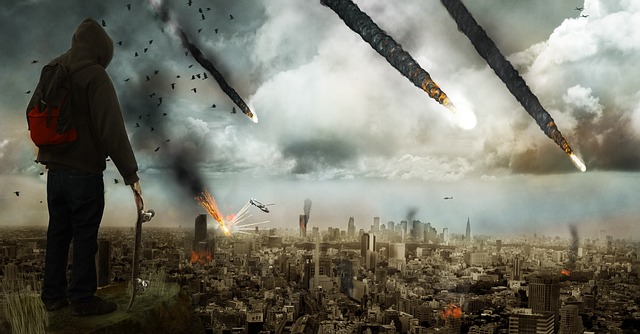 Submitted by Mad Max on
Submitted by Mad Max on

Image by Fabien Huck from http://Pixabay.com
Nuclear Doomsday. But why worry about a nuclear doomsday now? The Cold War is over. At its height we had thirty thousand warheads pointed at the Soviets, they had forty thousand pointed at us – but we’re each down to a fraction of that. A climate doomsday seems much more likely.
For one thing, there are still enough nuclear weapons in each arsenal to incinerate the earth, cause a nuclear winter, and extinguish practically all life on earth. But why not take comfort in the fact that exactly one country has ever seen fit to use a nuclear weapon in war—and that was over 70 years ago?
Because that’s one country… so far. But more countries are getting into the nuclear act all the time, like India and Pakistan, Israel, and North Korea. Some terrorist with a dirty bomb may be next. It’s hard not to think that the more players there are with nukes, the more likely they are to be used again.
Of course, when the United States dropped the A-bomb on Japan, we had a nuclear monopoly. Since we lost that monopoly, not a single nuclear weapon has been unleashed—which is not to say we haven’t come close. People of a certain age will certainly remember the Cuban Missile Crisis, and President Kennedy going on national TV urging Americans to start building fallout shelters.
So how could anyone be sanguine about nuclear proliferation? Obviously in a perfect world, no nation would have nuclear weapons. Unfortunately, we don’t live in a perfect world. As long as the US, Russia, China, and others insist on having huge nuclear arsenals, you can’t expect other countries not to pursue them.
So is that a recipe for disaster, or just a recipe for a nuclear standoff? If nation A has nuclear weapons and nation B doesn’t, nation A can push nation B around. But if both nations have them, they don’t mess with each other. Sure, complete disarmament would be better. But a standoff beats both nuclear war and nuclear domination.
Of course, that argument can sound like a nuclear version of the NRA’s argument that we’re all safer if guns are everywhere. More weapons means more chances for accidents or strategic miscalculations or chest thumping brinkmanship. If we want nuclear safety, we’ve got to break the nuclear wheel.
But how precisely do we do that? We can’t expect many nations to unilaterally disarm. We can’t even expect the U.S. and Russia to agree to MUTUAL disarmament, not with China waiting in the wings to become the world’s dominant nuclear power.
But it’s also possible to consider nuclear weapons mostly useless anyway. After all, nuclear weapons didn’t save the Soviets from defeat in Afghanistan, or forestall the collapse of the Soviet empire. They didn’t prevent America’s debacles in Iraq or Vietnam, or stop the Twin Towers from collapsing. They certainly helped Israel solve its Palestinian problem.
It’s almost as if nuclear weapons are meant to be useful in the way that a cocked and loaded gun is useful, as instruments of intimidation—except, of course, that if you have to actually fire them, you’ve failed. Plus the next time someone fires them, it will almost certainly be the last time they or anyone else gets to use them. That’s a pretty limited form of utility.
Ken Taylor
https://www.philosophytalk.org/blog/doomsday-doctrine
- 383 reads